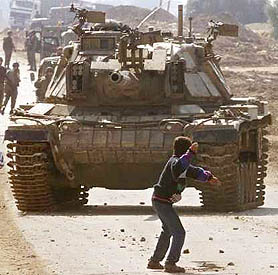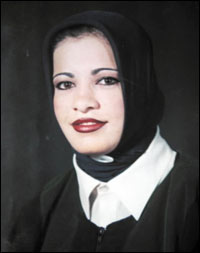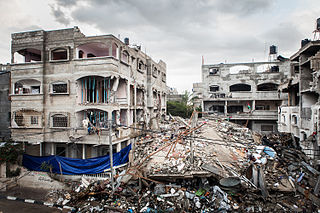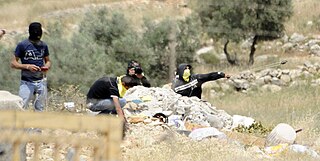
Yasser Arafat, also popularly known by his kunya Abu Ammar, was a Palestinian political leader. He was chairman of the Palestine Liberation Organization (PLO) from 1969 to 2004, President of the State of Palestine from 1989 to 2004 and President of the Palestinian Authority (PNA) from 1994 to 2004. Ideologically an Arab nationalist and a socialist, Arafat was a founding member of the Fatah political party, which he led from 1959 until 2004.

The Israeli–Palestinian conflict is an ongoing military and political conflict about land and self-determination within the territory of the former Mandatory Palestine. Key aspects of the conflict include the Israeli occupation of the West Bank and Gaza Strip, the status of Jerusalem, Israeli settlements, borders, security, water rights, the permit regime, Palestinian freedom of movement, and the Palestinian right of return.

The First Intifada, also known as the First Palestinian Intifada, was a sustained series of non-violent protests, acts of civil disobedience and riots carried out by Palestinians in the Israeli-occupied Palestinian territories and Israel. It was motivated by collective Palestinian frustration over Israel's military occupation of the West Bank and the Gaza Strip as it approached a twenty-year mark, having begun in the wake of the 1967 Arab–Israeli War. The uprising lasted from December 1987 until the Madrid Conference of 1991, though some date its conclusion to 1993, the year the Oslo Accords were signed.

The Second Intifada, also known as the Al-Aqsa Intifada, was a major uprising by Palestinians against Israel and its occupation from 2000. The period of heightened violence in the Palestinian territories and Israel continued until the Sharm el-Sheikh Summit of 2005, which ended hostilities.

The Camp David Accords were a pair of political agreements signed by Egyptian president Anwar Sadat and Israeli prime minister Menachem Begin on 17 September 1978, following twelve days of secret negotiations at Camp David, the country retreat of the president of the United States in Maryland. The two framework agreements were signed at the White House and were witnessed by President Jimmy Carter. The second of these frameworks led directly to the 1979 Egypt–Israel peace treaty. Due to the agreement, Sadat and Begin received the shared 1978 Nobel Peace Prize. The first framework, which dealt with the Palestinian territories, was written without participation of the Palestinians and was condemned by the United Nations.

The 2000 Camp David Summit was a summit meeting at Camp David between United States president Bill Clinton, Israeli prime minister Ehud Barak and Palestinian Authority chairman Yasser Arafat. The summit took place between 11 and 25 July 2000 and was an effort to end the Israeli–Palestinian conflict. The summit ended without an agreement, largely due to irreconcilable differences between Israelis and Palestinians on the status of Jerusalem. Its failure is considered one of the main triggers of the Second Intifada.

Daniel MosesBarenboim is an Argentine-Israeli-Palestinian-Spanish classical pianist and conductor based in Berlin, who also has Spanish and Palestinian citizenship. From 1992 until January 2023, Barenboim was the general music director of the Berlin State Opera and "Staatskapellmeister" of its orchestra, the Staatskapelle Berlin.

Benny Morris is an Israeli historian. He was a professor of history in the Middle East Studies department of Ben-Gurion University of the Negev in the city of Beersheba, Israel. Morris was initially associated with the group of Israeli historians known as the "New Historians", a term he coined to describe himself and historians Avi Shlaim, Ilan Pappé and Simha Flapan.

Hanadi Tayseer Abdul Malek Jaradat was a Palestinian terrorist from Jenin, who blew herself up on Saturday, 4 October 2003 in a suicide attack on Maxim restaurant, a Haifa restaurant co-owned by the same Jewish and Arab families for more than 40 years. She killed 21 Jewish and Arab Israelis, and injured 51 other people. Among the dead were four Israeli children, including a two-month old infant, and five Arabs. She had been recruited by Islamic Jihad.
Issues relating to the State of Israel and aspects of the Arab–Israeli conflict, and more recently the Iran–Israel conflict, occupy repeated annual debate times, resolutions and resources at the United Nations. Since its founding in 1948, the United Nations Security Council, has adopted 79 resolutions directly related to the Arab–Israeli conflict as of January 2010.
Tamer Nafar is a Palestinian rapper, actor, screenwriter and social activist of Israeli citizenship. He is the leader and a founding member of DAM, the first Palestinian hip hop group.

Seeds of Peace is a peacebuilding and leadership development non-profit organization headquartered in New York City. It was founded in 1993. As its main program, the organization brings youth and educators from areas of conflict to its summer camp. It also provides local programming to support Seeds of Peace graduates, known as Seeds, once they return home. It is a non-political organization that teaches youth peace-making skills.

Ludwig is a 1973 English-language epic biographical drama film co-written and directed by Luchino Visconti. The film stars Helmut Berger as King Ludwig II of Bavaria and Romy Schneider as Empress Elisabeth of Austria, along with Trevor Howard, Silvana Mangano, Helmut Griem, and Gert Fröbe. It is the third and final part of Visconti's "German Trilogy", following The Damned (1969) and Death in Venice (1971).
Arthur Allan Seidelman is an American television, film, and theatre director and an occasional writer, producer, and actor. His works are distinguished by a humane, probing, and sympathetic depiction of characters facing ethical challenges. His approach to directing is guided by his belief that character and relationships, along with an emphasis on genuine emotion over intellectualization, are the keys to unlocking the dramatic potential of a performance, a play, or a screenplay.

Jabalia Camp is a Palestinian refugee camp established in 1948 by the United Nations to house those displaced by the 1948 Palestinian expulsion. Located 3 kilometers (1.9 mi) north of Jabalia in the Gaza Strip, it is the largest refugee camp in Palestinian territory, with more than 100,000 inhabitants. Due to Israeli attacks during the Israel–Hamas war, the refugee camp was described as "destroyed".

The Promise is a British television serial in four episodes written and directed by Peter Kosminsky, with music by Debbie Wiseman. It tells the story of a young woman who goes to present-day Israel and Palestine determined to find out about her soldier grandfather's involvement in the final years of Palestine under the British mandate. It premiered on Channel 4 on 6 February 2011.
Events in the year 2000 in Palestine.

Omar Barghouti is a founding committee member of the Palestinian Campaign for the Academic and Cultural Boycott of Israel (PACBI) and a co-founder of the Boycott, Divestment and Sanctions (BDS) movement. He received the Gandhi Peace Award in 2017.

Uri Avnery was a German-born Israeli writer, journalist, politician, and activist, who founded the Gush Shalom peace movement. A member of the Irgun as a teenager and a veteran of the 1948 Palestine war, Avnery sat for two terms in the Knesset from 1965 to 1974 and from 1979 to 1981. He was also the owner and editor of the news magazine HaOlam HaZeh from 1950 until its closure in 1993.

Palestinian stone-throwing refers to a Palestinian practice of throwing stones at people or property. It is a tactic with both a symbolic and military dimension when used against heavily-armed troops. Proponents, sympathizers, as well as some analysts have characterized stone throwing by Palestinians as a form of "limited", "restrained", "non-lethal" violence. Such stone-throwing can at times prove lethal: over a dozen Israelis, including women, children, and infants, have died as a result of stones being thrown at cars. Some Palestinians appear to regard it as symbolic and non-violent, given the disparity in power and equipment between the Israeli forces and the Palestinian stone-throwers. The state of Israel has passed laws to sentence throwers convicted of the charge to up to 10 years imprisonment even without proof of intent to harm. In some cases, Israelis have argued that it should be treated as a form of terrorism, or that, in terms of the psychology of those who hurl stones, even in defense or in protest, it is intrinsically aggressive.
















